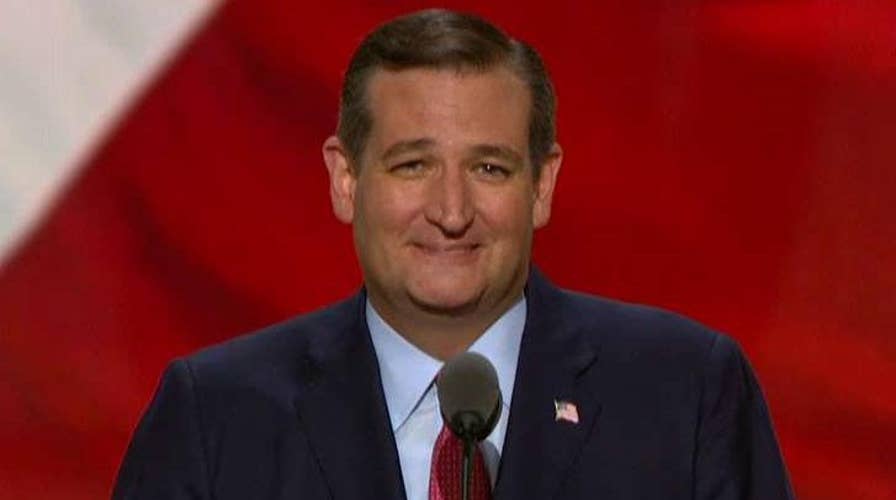Full speech: Ted Cruz at the Republican National Convention
Texas senator and former Republican presidential candidate touts party principles and freedom in Cleveland
“I congratulate Donald Trump on winning the nomination last night.”
That was Texas Sen. Ted Cruz’s only mention of the GOP's presidential nominee during his speech Wednesday night at the Republican National Convention in Cleveland. And that was only after he referenced hometown hero Lebron James and the Cleveland Cavaliers recent NBA championship.
Throughout his speech, which ended with him leaving the stage to boos and chants of “Trump,” Cruz sidestepped any other reference to Trump and barely touched on the candidate’s policies – and came far from endorsing his candidacy. Instead, the Texas lawmaker spent his time on stage giving what appeared to be a speech announcing his own candidacy for 2020.
“We’re fighting, not for one particular candidate or one campaign, but because each of us wants to be able to tell our kids and grandkids, our own Carolines, that we did our best for their future, and for our country,” Cruz said, referencing the daughter of one of the police officers killed in Dallas two weeks ago.
The Cruz and Trump campaign reached an agreement that the speech would not be vetted before Cruz took the stage.
Even before he spoke on Wednesday evening, Cruz already seemed to have an eye on his own political future, holding a rally with hundreds of supporters who greeted him with chants of "2020" — suggesting Cruz's backers have no interest in seeing Trump become a two-term president.
“Vote your conscience, vote for candidates up and down the ticket who you trust to defend our freedom and to be faithful to the Constitution,” Cruz said.
After Cruz said that line, the New York delegation began chanting “We want Trump.”
Cruz’s speech comes after a vicious primary battle that saw the Texas senator, Trump and Ohio Gov. John Kasich fight for the nomination until early May and the Indiana primary, where Trump clinched the number of delegates he needed to win the nomination.
On the campaign trail, Trump nicknamed Cruz "Lyin' Ted," and derided him as "unstable," ''crazy," ''a maniac" and "sick."
Trump also questioned whether Cruz's birth in Canada disqualified him to run for president, frequently threatening to sue him over the issue. He never followed through, but several suits were filed, including in Cruz's home state of Texas.
Cruz initially avoided attacking Trump, hoping that the former reality TV star's supporters would flow to him if Trump flamed out. As Trump's momentum grew with early primary victories, Cruz decided to fight back – labeling Trump a "pathological liar" and "utterly amoral" and claiming he can't be trusted because of his past support for Democrats, abortion rights and same-sex marriage.
During his time in the race, Cruz also argued he was the only true conservative in the race after he built his reputation in the Senate where he clashed both with Democrats and members of his own party over his ideological stubbornness.
Despite not endorsing Trump outright, Cruz did back some of the billionaire businessman’s proposed polices, especially in regard to Trump’s controversial immigration plan and his plan to build a wall along the U.S.-Mexico border.
“We deserve an immigration system that puts America first,” Cruz said. “And yes, builds a wall to keep us safe.”
While he didn't plug Trump, he did slam the Obama administration’s policies.
“President Obama is a man who does everything backwards – he wants to close Guantanamo Bay and open up our borders, he exports jobs and imports terrorists,” Cruz said. “There is a better vision for our future: A return to freedom.”
Presumptive Democratic nominee Hillary Clinton also wasn’t spared during Cruz’s speech.
“Hillary Clinton believes government should make virtually every choice in your life. Education, healthcare, marriage, speech – all dictated out of Washington,” Cruz said.
Rep. Steve King, a conservative leader and close adviser to Ted Cruz, told Fox News Latino after the speech that Cruz said exactly what was expected of him.
"He told people to vote up and down the ticket," King said. "But it was not an endorsement, people didn’t expect there would be one.”
The Associated Press contributed to this report.





